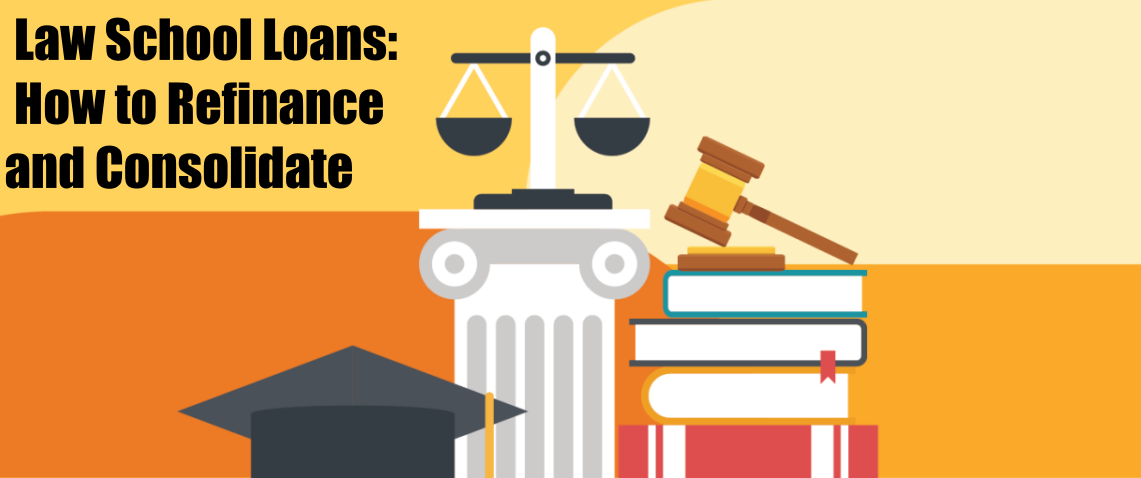After the hustle and bustle of undergraduate study as a law student, you enter law school and face yet another form of expenses altogether that could require you to need another form of loan, that’s where law school loans come in handy.
Law School Loans
In light of this, we shall be discussing law school loans and how to refinance and consolidate them in this article.
What Are Law School Loans
Law school loans are a type of graduate school loan offered to students pursuing a career in law and are currently in law school. Law school loans usually offer higher loan amounts than undergraduate loans as a result of higher costs incurred during the period of law school. Law school loans proceeds are used to settle expenses such as tuition, and other related law school expenses.
The loans are unique in that when this type of loan is assessed, the lender sends the loan to the school where the beneficiary is learning and the student starts making repayment plans.
Law school loans offer a choice of fixed interest or variable interest as interest rates are the same throughout the loan period for fixed, while for variable, interest amount could change from month to month based on the trends of the current market.
Eligibility Requirements for Law School Loans
Each law school will have various eligibility requirements laid out for its applicants, however, there are some general eligibility criteria to be fulfilled to assess law school loans, one of which is that the applicant must be a law school student, repayment ability is also taken into account when offering law school loans. The amount of financial assistance needed by the law school student determines who the student should turn to for law school loans as private lenders offer more in amount than federal loans.
Repaying a Law School Student Loan
Graduates of law school are expected to begin repayment of their law student loans immediately after exhausting their repayment grace period. The grace period can differ from one lender to another depending on the lender’s business policy. With Direct Unsubsidized Federal Student Loans, students are allowed a period of six-month grace, after which students become responsible for paying the interest for the time they were both enrolled in a law school program as well as using their grace period. If a student should find themselves struggling or unable to pay back their law student loans in time, they are expected to contact a loan provider immediately to decide how best to handle the matter.
How to Refinance law school loans
Refinancing is one of the best ways in which a debtor can clear their debt, Refinancing involves having a new loan with new interest rates and repayment options which you pay off your existing loans. You should refinance your law school loan if:
- You are a high-income earner: High-income earners would not necessarily need federal loan repayment options as the income of the individual would be equal to the task of paying the interest accrues from refinancing.
- You work in the private sector: Because public sector workers would have better federal loan repayment options, they should avoid refinancing, but for this in the private sector without these federal repayment plans, refinancing could come in handy in helping the individual repay their loan.
- You already have private loans: Whether you took a private loan for law school, or for when you were in undergrad school, it makes sense to refinance them if you’ll qualify for a lower interest rate — even if you work in the public sector. Private loans won’t qualify for federal repayment programs.
Here are a few steps that would guide you, if you are looking to refinance your law school loan:
- Compare the offers available to you: Before going for the refinancing option, it is best to compare various lenders and understand what you stand to gain from refinancing from each of the lenders. To compare what a lender is offering, it is better to reach out to them and find out their terms and conditions.
- Select the plan that best suits you: When you have successfully compared the offers available in terms of their pros and cons, you should go for the one that best suits your lifestyle, income, and repayment plan. While selecting a plan it is important to decide whether you want to lower your payments or if you lower the amount of time you are going to spend in debt.
Also Read: Should I Refinance My Student Loan? Pros and Cons
- Remember the benefits lost and the ones gained while refinancing: There are various benefits gained from assessing loans with certain lenders like low-interest rate, discount on the first repayment, etc. Refinancing could mean you lose those benefits, while other benefits can be gained from refinancing with a particular lender. It is important to weigh your benefits very well, understand what you stand to gain, or what you stand to lose from refinancing with each lender, and take your decision within those areas.
- Contact the lender and check their web portal: While trying to refinance, it is important to beware of scammers and do due diligence in finding out the legitimacy of any lender you choose to refinance with. Check their online presence, check state regulators to know if they have been registered, etc.
Consolidating your law school loans.
Consolidating your law school loans is only possible if you have assessed federal student loans while you are in law school, it is only advisable to consolidate your law school loans if:
- You have not used up your grace period: most loans usually have a grace period of six months, and it is best to consolidate your loans when you have not used up the grace period attached to these loans.
- If you are working, or if you will be working in public service: There are federal plans for debtors working within public service sectors, and you could benefit from these plans if you consolidate your student loans.
Conclusion
Law school loans could be a lifesaver for some, for others an open door when it comes to tackling several law school expenses, however, be careful to do proper research when going through this loan path as a mistake could land you into ultimate frustration, learn to pay back your loans on time and also know when you should refinance, or consolidate.

